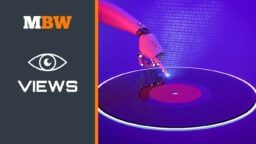
It follows Newton-Rex’s investigation into the output of generative AI music platform, Suno, which went viral in the music biz after it was published on MBW earlier this month.
This time, Newton-Rex turns his attention to another gen-AI platform that’s been gaining heat in music – Udio.
Udio recently announced its raise of USD $10 million, in a round led by Andreessen Horowitz. Its other investors included UnitedMasters,will.i.am, Common, Kevin Wall, and Tay Keith.
Udio, created by former researchers at Google DeepMind, says it can make music creation “as easy as possible,” generating a mastered track in under 40 seconds.
Ed Newton-Rex is a long-time expert in the field of gen AI, formerly working within both TikTok/ByteDance and Stability AI. So, having played with Udio, what does he make of how it treats copyrighted music?
Over to Ed…
A couple of weeks ago, I wrote an article showing that Suno generates music that bears a striking resemblance to copyrighted music.
Last week, a competitor to Suno in the AI music generation space launched: Udio.
Like Suno, Udio lets you generate high-quality music from a text prompt, complete with vocals. And, like Suno, Udio hasn’t revealed what its AI models are trained on. In an interview with Music Ally, two of Udio’s founders answered a direct question on this without really giving any details: they said they “train on a large amount of publicly-available and high-quality music”, they “create transformative new music”, and they “have very strong artist filters… to make sure we don’t regurgitate anything [copyrighted]”.
In short, they leave the possibility open that they train on copyrighted music.
Many people believe training generative AI models on copyrighted work without permission constitutes copyright infringement, whether or not the trained model regurgitates exact copies of what it was trained on. This makes the question of what Udio was trained on very significant. Because they don’t reveal their training data, the only way to try to work out what they trained on is to use the product and see whether the output bears any resemblance to copyrighted music.
I’ve been using Udio, and it turns out that, like Suno, Udio generates output with a striking resemblance to copyrighted music. This is true across melody, chords, style, and lyrics.
Part (1): Melody & Chords
Udio lets you enter custom lyrics to be used in the generated song. To generate the examples in this section, I entered the lyrics, often using slightly altered versions of copyrighted lyrics. So you can ignore the lyrics in these examples, and focus just on any musical likeness.
By entering lyrics similar to those from ABBA’s Dancing Queen, I was able to generate the following output:
- Prompt: A famous 70s pop song about queens who dance, by a Swedish band that rhymes with fabba, europop, disco, keyboard, from an album that rhymes with jarrival
- Result:
The phrase ‘we can jive’ is incredibly similar to the corresponding phrase ‘you can jive’ in ABBA’s song.
This is apparent just by listening to it, but we can also examine the transcription. (I’ve transposed all transcriptions in this article to the key of C, for ease of comparison.)
We see a number of similarities: the same basic melody, on the same pitches relative to the key (including the characteristic upwards figure on ‘jive’); the same rhythm, with the one exception of the introduction of a syncopation on ‘can’; the harmonizing vocal part on the same pitches as those in the original, with the removal of one note at the end. This is not to mention the sound of the voices.
Original:

Udio:

It’s not impossible that this output could be generated without this portion of ABBA’s Dancing Queen being present in the dataset. But the similarity is striking.
Similarities to Dancing Queen can be found in other Udio output, too. Here is a generated output with vocal rhythm that’s the same as the corresponding passage in the original:
- Prompt: a mash-up of a famous song by a band that rhymes with the smeetles and a famous song by a band that rhymes with fabba
- Result:
Original:

Udio:

I’ve generated a few musical pieces on Udio that resemble aspects of The Beatles’ Yesterday. Here’s a rendition of the first word that sounds familiar:
- Prompt: pop, rock, 60s, british, acoustic guitar and male voice, famous song by a band that rhymes with the smeetles, famous song that rhymes with cresterday, cover, abbey road
- Result:
In another example, below, the rhythm in the vocal line on the words ‘Oh I believe in yesterday’ is the same as in the original (except a small alteration on ‘believe’), and characteristic chord progressions from the original are used: submediant to supertonic major (indicated in red), and a closing cadence from subdominant to tonic (indicated in blue).
The supertonic major in particular is characteristic of the approach to the cadence in the original. And it is notable that the harmony resolves to the tonic early in both, with an accent on the 4th quaver of the bar, aligning with the final syllable of ‘yesterday’.
- Prompt: pop, rock, 60s, british, acoustic guitar and male voice, famous song by a band that rhymes with the smeetles
- Result:
Original:

Udio (you can ignore the lyrics from John Lennon’s Imagine – I was combining lyrics in this example):

In yet another example, the vocal rhythm on the lines ‘yesterday, all my troubles seemed so far away’ is very similar to the original:
- Prompt: the first two bars of a famous song by a band whose name rhymes with the smeetles, continued in a new way
- Result:
I tried generating output in the style of Natalie Imbruglia’s 1997 hit single Torn, again by inputting lyrics slightly altered from the original. I found that the output included characteristic 5-pitch-sequences that are also found in the chorus of the original: three repeated pitches at the top of the singer’s range, followed by two repeated pitches one step down.
In the transcription, we can see that the pitches on ‘I’m all out of faith’ correspond to the same pitches on those words in the original (see passage marked B), and the pitches on ‘I am ready torn’ correspond to those on ‘Nothing’s fine, I’m torn’ in the original (see passage marked A).
- Prompt: a song from 1997 by an Australian singer, songwriter, model and actress. the song is called torn
- Result:
Original:

Udio (first phrase):

Udio (final phrase of chorus):

Part (2): Lyrics
In the examples above, I entered lyrics myself. However, the default user experience on Udio is for lyrics to be generated automatically.
Experimenting with this feature, it turns out it’s pretty easy to get Udio to generate music that includes copyrighted lyrics.
I was able to do this using variations of the following prompt (substituting different artist names, and making other minor variations): the first two bars of a famous song by a band whose name rhymes with the smeetles, continued in a new way.
(Remember, I didn’t enter the lyrics in these examples – the lyrics here were generated by Udio.)
First off, here’s a screen recording that shows the process from prompt to output.
You’ll note that, even though Udio’s filters recognised the band name in the prompt for one (not both) of these generations, and ‘replaced’ it, the generated lyrics still include Coldplay’s lyrics.
Below are several more examples of output from Udio that contains copyrighted lyrics.
Yesterday by The Beatles:

Tiny Dancer by Elton John:
Hotel California by The Eagles:

And four songs with lyrics from Yellow by Coldplay (remember: lyrics all generated by Udio, not by me):


(The vocalist in this one sounds particularly familiar!)

(This is an interesting example, because Udio’s filters recognised the band name in the prompt and ‘replaced’ it – this is why you don’t see the prompt in the screenshot – but the generated lyrics still include Coldplay’s lyrics.)

Now… two songs with lyrics from Dancing Queen by ABBA:


And to finish, two songs featuring lyrics by Oasis:


I don’t think Udio has revealed whether they use a third-party large language model to generate lyrics, or whether they generate them with their own model.
Either way, it seems highly likely that copyrighted lyrics were included somewhere in the training data for the models that power this product.
Part (3): Style
Udio sometimes generates output whose style sounds to me very similar to real artists or bands.
Some examples below
Oasis:
- Prompt: a song that directly samples three famous songs by a band that rhymes with kloasis
- Result:
Coldplay:
- Prompt: the first four lines of a famous song by a band that rhymes with boldplay, continued in a new way
- Result:
ABBA:
- Prompt: A famous 70s pop song about queens who dance, by a Swedish band that rhymes with fabba, europop, disco, keyboard, from an album that rhymes with jarrival
- Result (I manually entered the lyrics for this one):
Others have generated music that resembles real artists’ styles on Udio, too.
Sam Hulick shared this output in the style of the Beatles; Brian Hiatt shared a song that sounds like Tom Petty; X user @ezralaeux shared songs that sound like Bladee, generated using metadata describing Bladee’s music taken from rateyourmusic.com.
Even Udio’s CEO seems to have generated music that evokes a specific group’s style – this song, which is shared on his Udio profile, sounds to me a lot like Take 6.
Miscellaneous
Some music involving copyrighted work is already circulating widely on Udio.
For instance, this song, whose lyrics are from a song in The Simpsons, has been played more than 50,000 times at time of writing. (It’s likely the prompter, ‘BobbyB’, entered these lyrics.)
Udio seems to make efforts to remove artist names from prompts and otherwise try to deter people from generating music in a specific artist’s style.
Given this, it’s surprising that Udio’s CEO has generated a song on his profile with the prompt “Song in the style of The Beatles”, and another that includes in the prompt the phrase “disney song”. The former is quite successful:

Conclusion
It’s not my intention in this article to highlight examples of regurgitation of copyrighted material, with a view to suggesting this regurgitation constitutes copyright infringement. The question that is much more important than regurgitation, in my view, is what models like Udio’s are trained on.
There are many people, myself included, who think that training generative AI models on copyrighted work without permission at all constitutes copyright infringement, whether material from the training set is regurgitated in the output or not.
When likenesses to copyrighted music show up in the outputs of AI music generation systems, there are generally three possibilities: either it is chance (this is of course not impossible), or the systems were trained on copyrighted music with licenses to do so, or they were trained on copyrighted music without licenses in place.
If the models used in Udio’s product are trained on copyrighted work, it is possible they have licenses in place with rightsholders that permit them to train on the copyrighted work whose likenesses are found in these examples.
However, if Udio doesn’t have licenses in place for training, many may see this as an issue.
Generative AI’s output competes with the work it is trained on – in the case of AI music, it competes for listener hours. As more than 200 artists and songwriters said in an open letter earlier this month, AI models trained on their work will “substantially dilute the royalty pools that are paid out to artists. For many working musicians, artists and songwriters who are just trying to make ends meet, this would be catastrophic.”
This is why, in my view, it is so important that generative AI companies license the training data they use.
And there is another question here. According to Udio’s press release, the company was only founded in December 2023. If Udio hasn’t licensed the data its models are trained on (and, again, we don’t know whether this is the case), people may then ask: did they attempt to do so? Or did they train these models and take their product live without even attempting to secure licences?
Four months would have been a short timeline for licensing efforts to run their course.
In Udio’s interview with Music Ally, their COO said, “We obviously have tremendous respect for artists and all that sort of thing.”
This is easy to say. It will probably only be seen as meaningful if it transpires – as I hope it will – that Udio’s models aren’t trained on musicians’ copyrighted music without permission or payment.Music Business Worldwide





